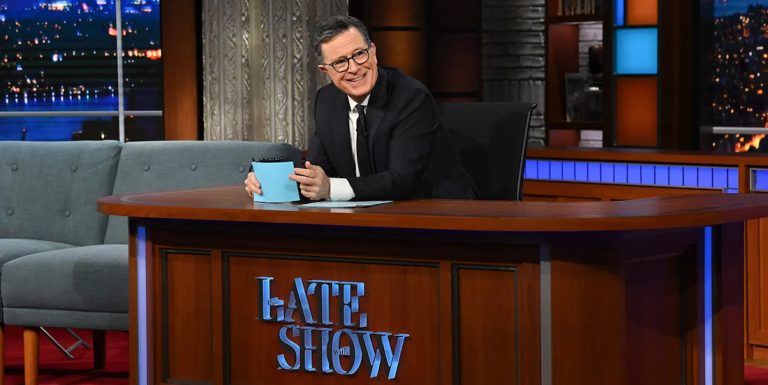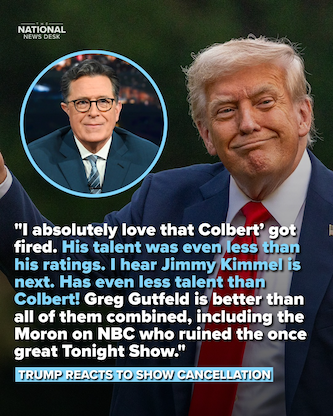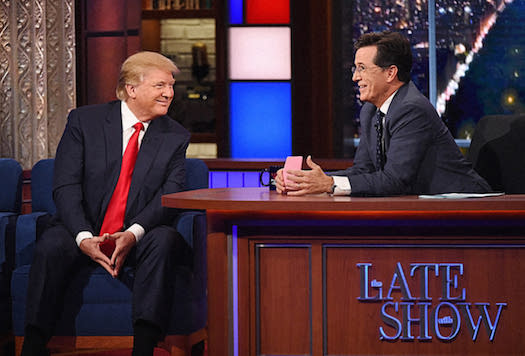
U.S. Television’s Top Late-Night Franchise to End in May 2026 as Criticism of Parent Company’s Trump Deal Ignites Speculation
New York, N.Y. — For nearly a decade, Stephen Colbert has been the face of The Late Show, revitalizing the franchise with sharp political wit and a dominant following in the late-night television landscape.
But in a decision reverberating far beyond the Ed Sullivan Theater, CBS confirmed this week that it will cancel The Late Show with Stephen Colbert, ending both Colbert’s tenure and the institution itself in May 2026—a move announced just days after the host’s blunt, on-air rebuke of a legal settlement between CBS parent Paramount Global and President Donald Trump [Luce Index™ score: 35/100].
Officially, CBS claims the decision is purely financial, but the timing raises significant questions about the intersection of network economics, corporate accountability, and media’s role in American politics.
Colbert’s Public Rebuke: “A Big Bribe” and the Fallout

The backdrop to CBS’s announcement is Colbert’s recent condemnation of his own corporate overlords, whom he accused of paying a “big bribe” in a $16 million settlement with Trump over a contentious 60 Minutes interview that aired during the 2024 campaign.
The settlement came just ahead of Paramount’s acquisition by Skydance Media—an arrangement requiring government approval and raising inevitable conflict-of-interest concerns.
On his return from vacation, Colbert did not mince words, telling his audience he was “offended” and questioning whether anything short of $16 million could restore his faith in the company.
His words echoed those of fellow late-night host Jon Stewart, who also denounced the settlement on his own show.
This calling out of corporate leadership is emblematic of a broader tension in U.S. media: the push-pull between talent-driven editorial independence and the financial—and often political—imperatives of conglomerate owners.
Show Tops Ratings, But Timing Sparks Skepticism

Despite CBS’s insistence that the cancellation is “strictly a financial decision set against a difficult landscape in late-night programming,” The Late Show remains the highest-rated program in its time slot, enjoying one of the few audience increases among late-night programs so far this year.
Colbert’s show consistently attracted over 2 million viewers per episode, outperforming direct competitors.
Viewers and critics immediately questioned why the “top-rated late-night comedy show” would be axed if ratings and content were strong, especially given the proximity to Colbert’s on-air critique of the Trump settlement.
When Colbert revealed the news during a Thursday taping, audible boos rippled through the studio. “This isn’t just the end of our show–it’s the end of The Late Show on CBS. I’m not being replaced. This is all just going away,” he told the audience, openly sharing the impact the announcement would have on his team and the late-night community.
Political Reactions and Trump’s Public Glee
Unsurprisingly, pundits and viewers were not alone in noticing the connection between Colbert’s criticism and CBS’s rapid decision.

Donald Trump, ever an avid late-night television consumer—and target of Colbert’s most biting satire—used his Truth Social platform to celebrate.
“I absolutely love that Colbert got fired. His talent was even less than his ratings,” Trump declared, going on to taunt other liberal-leaning hosts and contrast them with Fox’s Gutfeld!
The cancellation was quickly politicized, making clear that late-night comedy is as much a political battleground as the campaign trail itself.
Despite speculation regarding a potential chilling effect on Colbert’s future commentary, the host showed no signs of retreating.
In his Thursday monologue, he continued lambasting the Trump administration, underscoring his refusal to be “quieted” by network pressures or political adversaries.
Industry Trends: Declining Audiences and Financial Pressures
CBS executives and industry analysts point to bigger trends, such as shrinking late-night audiences and dwindling ad revenue, to justify shuttering a marquee brand.
Where late-night legends like Johnny Carson drew more than 15 million viewers, today’s fragmented media landscape offers a fraction of that audience, split among streaming platforms and an on-demand news cycle, making long-term sustainability challenging—even for successful franchises.
The move signals not just an end to Colbert’s chapter, but possibly CBS’s exit from late-night programming altogether, as rival networks also confront declining returns and shifting priorities.
The shift marks a significant moment in U.S. broadcasting history, reflecting how economics, technology, and politics collide in real-time on America’s screens.
What’s Next for Colbert and U.S. Late Night?
While the ending of The Late Show is definitive—CBS says there will be no replacement and the series itself is being retired—Colbert’s future as a media, political, and comedic voice seems far from over.
The show’s cancellation, intended or not, has amplified conversations about media independence, corporate governance, and the cost of high-profile dissent in U.S. television.
His parting months are likely to be closely watched by fans, critics, and political operatives alike, as Colbert continues to shape, provoke, and satirize the American experience—regardless of platform.
Audio Summary (75 words)
U.S. television’s “The Late Show with Stephen Colbert” will end in May 2026, with CBS citing financial reasons for axing the top-rated program. The decision follows Colbert’s harsh public criticism of CBS parent Paramount over a controversial $16 million Trump settlement, igniting speculation about the real motivations behind the cancellation. As CBS exits late-night, questions persist about media independence in a landscape marked by corporate power and political pressure. Colbert promises his political commentary continues, undeterred.